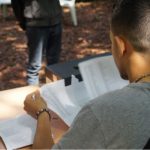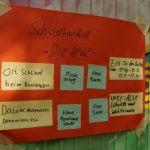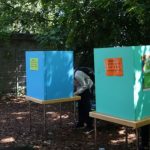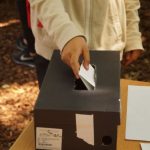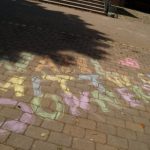
Schüler*innen Haushalt (Pupils PB)
Description
School Civic Budget (Schüler*innen Haushalt) – is a project to strengthen the democratic competences of children and young people and increase their involvement in school life.
The project itself is coordinated by the NGO – Servicestelle Jugendbeteiligung e.V., which supports the whole process at schools in terms of the content and partly in terms of its organization. It is carried out in Berlin but also in other cities and regions of Germany in case of enquiries. The project has been implemented since 2015.
Preparation
School Civic Budgets are an instrument to enable children and young people to participate in democratic activities and take additional responsibility for the actions. Young people also have an influence on these processes.
The whole school community decides democratically how to spend an allocated funds. The decision-making process is coordinated by the student coordination team and planned and implemented with the help of accompanying adults (usually teachers or social workers).
It is also important that the process is of a long-term nature, which, through its cyclical nature, is aimed at the democratization of schools and increasing its impact on students and school culture.
The offer of the coordinating organisation is tailored to the interests and declared needs of students and accompanying adults. As a result, there is a shift in increasing an emphasis on democratic values, including topics such as: what democracy is, what democratic processes in the society are, why it is so important to ensure that the premises of democracy are understood, etc.
Implementation
Main phases of the project:
Phase 1. Announcement at the school and formation of the coordination team (consisting of students):
- Kick-off event at the school;
- all members of the school (students, teachers) are informed about the student participatory budget;
- students in the coordination team are accessible to all interested parties;
- the coordination team organises the student participatory budget at the school;
- the coordination team is supported by teachers or school social workers.
Phase 2. Collecting ideas:
- everyone is informed where and how ideas can be submitted;
- students submit their ideas which can be used in the projects submitted to the student participatory budget.
Phase 3. Examination of ideas and consultation:
- the coordination team checks the proposals for feasibility;
- consultations with the accompanying person and, if it is necessary, with the school management, the administration or the coordinating organisation.
Phase 4. Election campaign and voting:
- students popularize their ideas during the election campaign,
- then they vote for their favourite projects
Phase 5. Implementation of the ideas:
- after the elections, the ideas are put into action, the orders are prepared. (The ideas chosen in the last voting in 2019 in Hemingway-School were table tennis sets, swinging chairs, punching bags)
Workshops for accompanying adults and young people are an integral part of the project. Apart from providing basic guidelines on the project idea, implementation principles and possibilities of supporting young people, the workshops also cover issues related to: democracy, necessity of social involvement, contemporary changes in this field, etc.
The workshop has three functions:
-
- to support the course of the project and the processes directly related to it (know-how, methodology, self-organisation, creating a space for activities, joint work, etc.);
- to provide tools to facilitate the understanding of processes of broadly defined democracy, (exchange of views, knowledge of understanding democracy and its basic principles, etc.);
- to create a platform to exchange ideas between schools, establish contacts.
Up to 3 students from the coordination teams and an accompanying adult always take part in the workshop. The workshop is also inteded to show that everyone is equal and can work together in the project.
Approximately 6 - 8 schools take part in one workshop each time. Workshops are carried out separately for primary and secondary schools, so they better respond to their needs and specificity of schools.
Workshops are initially organized in order to start the project. During workshops participants learn about their roles, the basics of the theory of democracy and the approximate structure of the project process.
Then, at a later stage, participants can choose one of four thematic workshops offered by the coordinating organisation. Each of them is foreseen for a different phase of the project and is related to a different area. This ensures that pupils particularly receive help in a specific topic of their interest when they need it.
At the end of the project, representatives of the coordinating organisation arrange visits to the schools in order to take a look at and summarise the common project year.
The final event gathers mainly students from coordination teams. The event is an opportunity to get to know each other, exchange experiences and show what activities are implemented
Representatives of authorities, local politicians, people responsible for the pedagogical supervision, local organisations working to strengthen the activity of children and young people (including youth organisations etc.) also attend this event. The whole meeting is coordinated by the main coordinator ((Servicestelle Jugendbeteiligung e.V.), who presents the project and its ideas during the event.
During the last round of the programme the participating schools prepared informative posters available to all participants (at the event and also on the project’s website).
The event programme also includes time for discussions and exchange of experience during refreshments buffet and stands with additional attractions (e.g. photo station, quizzes and a ball pool).
All coordination teams receive the certificate and small gifts from regional politicians in recognition of their work. In addition, students vote for gifts which they want to receive.
In addition, students are supported by a person from the coordinating organisation. People from this organisation visit schools and support students, teachers etc. They also provide important factual information about the course of action, rules and guidelines, answer questions and are available all the time. Each school has one contact person from this organisation.
Implementation and participation in the project are linked with the acceptance of several basic principles. In particular, all pupils must be able to vote. And in most cases this rule is respected without problems. If this is not the case, for example when the coordination team is not accessible to all pupils, the situation is discussed together with school authorities in order to find the best solution.
However, a number of organisational principles is set as general guidelines. Each school is different so it may be necessary to adapt the rules to the situation. For example, there are schools where the whole class put forward an idea rather than individual students and pupils.
In order to facilitate the project implementation by the schools, the coordinating organization may provide templates of documents to implement activities. Schools may also modify them when it is necessary.
Ways of engaging young people
Students can get involved at several levels. First of all, they can apply for being the part of the coordinating team and/or take part in the submission of ideas and voting for them. Each student (and only students) can submit a proposal - the idea can be voted when it has at least three to five supporters.
To organize the election, the organization team can be divided into groups of 2 people, where:
- - one of the groups designs the posters,
- - another group creates ballot papers,
- - another one evaluates the wish lists and one writes texts.
One of the priority actions of the coordinating organization is to make it clear to the schools how important it is that information about the project activities will reach all potential stakeholders, and the full participation in the election process requires special attention to be given to inform about the elections. The idea is that schools can inform about the project on their websites, in social media, by communicating directly with students etc. Therefore, in practice, information about elections looks different. Some schools put up information posters, others put emphasis on verbal communication between students, and others put information on the school websites, fan pages or instagram.
As each school has its own specificity, over-rigid guidelines shouldn’t be given. Schools themselves know which forms of dissemination work best.
Role of young people
- Participants
- Helpers
- Managers to deliver the process
Positive aspects of the project/process
There are four main rules in this area:
Democracy
Students democratically decide what they want to change at their school.
Participation
Students actively exercise their right to participate in everyday school life and beyond.
Self-organization
Students are given the opportunity to gain experience in planning and self-organization in a team work.
Self-efficacy
Students experience the situation when they can make a difference at their school and have an influence on undertaken decisions.
It is also important to include students who were not previously involved in this type of activity, taking into consideration people at risk of exclusion (minorities, disabled people). One of the most important features of the project is that the project is especially addressed to all kind of schools, also schools where excluded, disabled people learn. During the project workshops it should be ensured that different groups of students have an opportunity to meet and exchange experience e.g. students with different degrees of disability.
Although there is no single, fixed parity which forces specific types of schools to participate in the project, the coordinating organization makes sure that schools with a high percentage of excluded young people are represented in the project. Thus, if an inclusive school or a school of high percentage of disadvantaged young people are willing to participate, they have a good chance to take part in the project. The coordinating organization selects the most appropriate schools and this choice will normally aim to ensure an improved social diversity.
Main obstacles to the project/process
It is often difficult to integrate the project within everyday school life. Additionally, if not everyone is sufficiently convinced of the project idea, full participation in workshops or plenary meetings, e.g. to inform about the project, is also partly blocked. This may reduce the quality of the project implementation. Therefore, it is important to always look for good solutions and modify the project in such a way that it fits the structure of a given school and at the same time the idea of the project remains unchanged. Possible changes should only be related to the organizational framework.
In subsequent editions, the aim of the project will be to organise the workshops in such a way that they will take place in the areas closer to particular schools - to facilitate participation, shorten the time of travelling, etc.
There is also a challenge to create an opportunity to vote online. Such a possibility has not existed yet. To vote online you need a system that can be used at school by everyone. Only then it will be possible to really guarantee democratic elections.
Opinion after implementation
The coordinating organisation constantly improves its offer, therefore the different stages of the activities are evaluated.
The evaluation results of activities carried out in 2019 show that 70% of pupils presented their own ideas or supported a colleague's idea.
At Hemingway School - 10 of 16 classes submitted ideas.
The attendance also confirms that – on average three quarters of students took part in voting.
Two thirds of participants were pleased with participating in the project, 9 out of 10 members of the coordinating teams were pleased too. Similar proportions of participants declare that they want to take part in the project again.
It can be observed that schools, which have been participating in the project for a long time, experience a social change - they increasingly integrate the idea of school civic budgets into their school culture, they treat the budgets as their regular tasks. It can also be observed that further efforts are undertaken to democratize the school.
It is described in the last report of the coordinating organization from 2019, in which the vast majority of the surveyed young people emphasizes that by participating in school participation budgets they did something useful (90%), and believes that the further project implementation (implementation of ideas) will be successful- 87%. The increased importance of democracy at schools was indicated by 84% of the surveyed students. Every third person wanted to get involved in the work of coordinating teams. More than 60% of the surveyed young people were willing to become socially involved in activities that go beyond the civic budgets outside the school system.
The concept of workshops (mentioned above) has been continuously optimized for recent years. Their aim was to support the process itself and this has not changed. However, more and more issues related the theory of democracy are introduced and developed together with the participants. The conviction about the democratic character of the whole process is supported in this way.
Accountability of resources
On the one hand, the project funds are provided by the Berlin Senate, i.e., they come from the public funds of the Federal Republic of Germany (there are 16 federal states in Germany). On the other hand, the funds are provided at the local level (a district of the capital city).
Berlin has the status of a separate federal state. Some schools may also increase the amount of funds available. The budget for each school usually ranges from € 1500 to € 4000, depending on the district. It also depends on the district how many schools will eventually be able to participate in the project.
Therefore, the task of the coordinating organization is to keep in touch with politicians and the administration. Showing good examples persuade people to the project and its results. To this end, regular meetings are also organized with representatives of local authorities, through which they are involved in specific activities when developing the project together.
1-3 tips (advices, warnings) from organizers or participants
It is important to establish jointly how the different project activities will look like, what tasks young people will have in the project and how they can carry them out, it is important to discuss, answer all questions and clarify ambiguities. The experience of the promoters shows that the more space and opportunities are offered to the students to implement their own ideas, the more actively they will become involved in their project, the more motivated they will be and the better the project itself will be.
For greater transparency, it is worth noting that funds are never transferred directly to schools, but they stay at the disposal of the coordinating organization or the local government. Schools initiate the implementation of tasks through a special form. In this way you can always know what is ordered and you can be sure that only the winning ideas are implemented.
The role of the coordinating organization is also to advise the schools throughout the project, also at the stage of implementation of previously selected ideas. If it turns out that an idea cannot be implemented according to the plan, the teachers and students engaged partiesjointly look for a solution.
Links to examples of application forms, voting styles, tools
Coordinating organisation:
Servicestelle Jugendbeteiligung e. V. – is a non-governmental organization supporting the participation and involvement of young people in the processes of democracy, social involvement and citizenship.
As a part of one of the projects titled- Schüler*innen Haushalt (as a free translation – Student Civic Budget), the task of this organisation is to coordinated and support the implementation of school civic budgets in the city of Berlin.
Links to documents, guidelines, reports (German):
schuelerinnen-haushalt.de/aktive/
flyer, leaflet
https://schuelerinnen-haushalt.de/wp-content/uploads/2020/10/Projektskizze.pdf
Guidebook
https://schuelerinnen-haushalt.de/wp-content/uploads/2021/02/SH_Handbuch.pdf
Exemplary idea sheets
https://schuelerinnen-haushalt.de/wp-content/uploads/2020/10/SH_Ideenzettel.pdf
ballot papers
https://schuelerinnen-haushalt.de/wp-content/uploads/2020/10/SH_Wahlzettel.pdf
youtube
